#milgram meta
Text
Haruka isn’t autistic-coded – he has an intellectual disability (and why that matters)
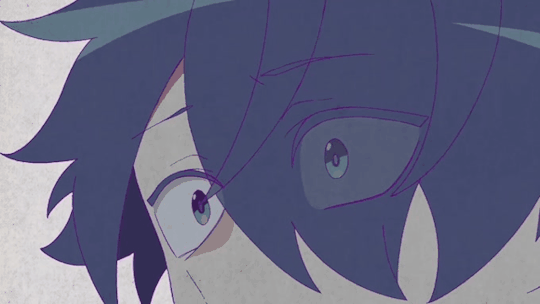
(AO3 Mirror)
A lot of people in the MILGRAM fandom (especially English-speaking MILGRAM fandom) state that Haruka is autistic-coded, as if it’s fact. Most recognize that Haruka is coded as disabled. (If you didn’t recognize that, I hope this post will help to explain why.) However, to state that he is coded as autistic specifically is incorrect. Haruka is coded as intellectually disabled.
Now, there are likely two things that contribute to this issue. One is the invisibility of intellectual disability as a whole, and another is the fact that a lot of this has to do with things that only someone who speaks Japanese would understand (such as complex vs non-complex words in Japanese).
In this post, I plan to lay out what an intellectual disability is and how it differs from neurodivergencies such as autism or ADHD. After that, I want to discuss the way Haruka speaks and uses words, the symbolism in his MVs, and how this lends to him being coded as intellectually disabled. Finally, I want to discuss why this even matters at all. Because, in truth, viewing Haruka as autistic instead of intellectually disabled leaves the viewer misunderstanding his story in a huge way that seems far too common in English-speaking MILGRAM fandom. So, I hope you listen to what I have to say.
What does it mean to be intellectually disabled?
Confusing autism and intellectual disability (henceforth referred to as ID) is not an issue unique to the MILGRAM fandom. They are quite commonly mistaken for each other, in the same way that autism and ADHD are both commonly mistaken for each other. And for the same reason, too – autism and ID are comorbid. This means that, if someone is autistic, they are more likely to have an ID. For this reason, it makes perfect sense to headcanon Haruka as autistic. I headcanon him as autistic, myself, actually. But, in this post, I’m going to be strictly talking about his coding, not headcanons, and he is very specifically coded with an ID.
So, what’s the difference? In the words of the National Institutes of Health, “Whereas ID is associated with general deficits across developmental domains, ASD is in fact defined by the observation that social communication deficits are particularly impairing.” (Source)
To say this in layman’s terms, autism is primarily characterized by difficulties in social communications. Cognitive abilities in autistic individuals vary, just like with allistic individuals, but the defining features are issues with social interaction and nonverbal communication. Autism by itself effects how effectively one communicates, but not intelligence. On the other hand, ID is a limitation on intellectual functioning, just like the name implies. This causes issues in areas like learning, problem-solving, and abstract reasoning.
A lot of people think ID is a synonym for ‘learning disability’. ‘Learning disability’ is an umbrella term that covers things such as dyslexia and dysgraphia. This isn’t the case. For one thing, ID can be a diagnosis on its own. ID is subdivided into syndromic ID, where intellectual deficits are present with other signs and symptoms, and nonsyndromic ID, where ID is, itself, the diagnosis. Examples of syndromic IDs include fragile X syndrome, and Down syndrome. For another, those with learning disabilities tend to have average to above-average intellectual abilities. Their disorder affects their ability to acquire and process information, but they are still able to learn. In contrast, ID affects the ability to learn at all, as well as affecting development and general function.
ID is a debilitating disorder. Many people with an ID cannot live independently, require help with self-care activities, and have limited communicative abilities. Understanding this – particularly, how ID is often a disability that requires a caregiver – is a key point to understanding Haruka as a character. But that’s to be covered later.
Words
The reason why this is a problem in the English fandom specifically is because the main thing tipping off the viewer to Haruka’s ID is the way that he speaks.
‘Weakness’, Haruka’s first-trial song, is written entirely in INCREDIBLY basic, elementary-level kanji – mostly hiragana and katakana. In fact, his first-trial song is misspelled in a lot of official releases of the song (‘Weekness’), which is a good way to get the same effect across. This is not the case across all platforms, though, for whatever reason. He also writes, in his trial 1 interrogation, with only that elementary-level kanji; often only one-word answers. The only complicated characters he knows are usually ones that mean something along the lines of, “I’m a stupid, idiot child,” which can be assumed to be because that’s what he has heard his whole life.
While I’m unsure if it is ENTIRELY in this basic kanji, his second trial song and interrogation is at least mostly written like this, as well. At this point, Muu is teaching him how to read and write (or, that’s what’s implied), but, even with that one-on-one attention, he is still speaking like a child most of the time to the Japanese ear.
When he’s forced to use or listen to words outside of this elementary-level kanji, he gets audibly confused, as well. In the AVIOT earbud collab, he has the voiceline, “Pairing seems to be in progress,” but, if you listen, he says “pairing” like it’s a question. (“Pair-ing?”) He doesn’t know the word is an English loanword that isn’t often used in everyday conversation, so he’s struggling to say it.
He also struggles when speaking to Es in his interrogations. He tries to say, “I will acknowledge any falsehood or silence,” but the words used are very advanced in Japanese. As such, he struggles with it, repeating, “False-hood? Si-lence?” Multiple similar exchanges happen in his interrogations, with Haruka misunderstanding words Es uses, and stuttering over unfamiliar words. The implication is that Haruka struggles with higher vocabulary or unfamiliar words, and with speaking and communication in general. He apologizes multiple times to Es for struggling, saying that he is not intelligent as an explanation multiple times. Additionally, in his second trial investigation, he talks about how he could never do the same things as everyone around him. When Es calls him stupid, he agrees. Es even states, “You really have no learning ability whatsoever.” When, mind you, having delayed or slowed learning is, like, the symptom of intellectual disability. It’s quite blatant. (Why is this not fandom consensus yet, again?)
Moving on from the point of how Haruka uses words, we can talk about other forms of word-based MILGRAM media. For example: when introducing himself, he says he thinks he’s 17, which implies that he isn’t actually sure. Additionally, there is lots of evidence for his intellectual disability in his interrogation questions:
He considers it impossible to learn another language
His dream is to ‘live normally’
He states he disappointed his father (not inherently an ID-related thing, but also, makes sense with his coding in mind)
Many answers imply that he’s been unable to live his own life, and he doesn’t really have any aspirations outside of being given attention
Finally, we have the lyrics to his songs. Again, on top of being written in very basic kanji, we have lines like the following, which include repeated themes of needing a caregiver (being ‘hopeless’ by himself), not being able to do what others can do, hating how he was born, and struggling to function. (I have bolded examples that I think are especially apt.)
“Why was I born like this? Why does it hurt so much?” / “Why was I born to be me? Why does it hurt so much?”
“Instead you kept calling me “hopeless” / You never called me by my name / You were always comparing me to someone else”
“If I tried and couldn’t say it, you would get angry at me and say “You’re hopeless”” / “When I tried to understand it, you’ll make that disappointed face again”
“I just wanted to be your good boy” (what did the MILGRAM team want us to think when they included this line? likely that he’s childish or ‘hasn’t grown up’, right?)
“Mommy, look / I’ve done great” (calling her ‘mommy’ instead of ‘mom’ – again, ask what the MILGRAM team wants us to think when they included this)
“If only I could do what anyone else could do”
“It’s enough, I am a “disappointment””
“My life started in a wrong spot”
With regards to his relationship with Muu, he doesn’t understand why Muu using him would be a bad thing, or how she is manipulating him. People with ID tend to have poor judgment, and Haruka not being able to tell the difference and not caring about the difference between negative and positive attention shows this (although his trauma definitely also plays a role).
Finally, we have the trial song titles.
We’ve already discussed how “Weakness” is sometimes alternatively misspelled as “Weekness”, and that is because the title in Japanese is, arguably, misspelled, too. The Japanese title is a play on the phrase jakuniku kyoushoku, which is equivalent to the English phrase, “Survival of the fittest.” More directly, it translates to, “The weak are meat, the strong do eat.” The character for “strong” (kyou) is replaced by “together” (also kyou) – with the implication being that Haruka forgot which version of the word was correct for this situation. This also works to create a pun, of sorts, as this makes the title more like, “The weak are meat, communal eating”, creating an emphasis on the fact that there are more people eating than there are ‘weak people’. There are differing ways to interpret this pun, but one way is to view it as a statement on Haruka’s status as a minority, oppressed (‘eaten’) by the majority.
On the other hand, we have All-Knowing and All-Agony. In Japanese, this song title is Zenchi Zennou, which can be translated as “Omniscient and Omnipotent”, used to describe the Christian God. Once again, we have what we can assume is Haruka misspelling the title, creating a pun. One that is much more on the nose, as the character for “ability” (nou) is replaced with the character for “worry, distress, pain” (also nou).
It seems that the reason why Haruka uses new complicated words (aside from the words meaning “idiot” and the like) in All-Knowing and All-Agony is because Muu is teaching him. It features the more complicated “食” (shoku; food), when we know from Haruka’s 2023 birthday portal that Muu is bringing him meals. It also prominently features Muu’s name, 夢 (yume; dream), which is more complicated, as well.
Imagery
Now, we get on to the non-verbal, more visually-based evidence for Haruka’s ID. Be prepared for a lot more images!
Going back to Muu teaching Haruka how to write: it’s not just clear in his usage of kanji, but also how he writes. Comparing his handwriting, it becomes much easier to read after Trial 2’s start, and his writing is soft and bubbly; much like a teen girl’s writing might be.
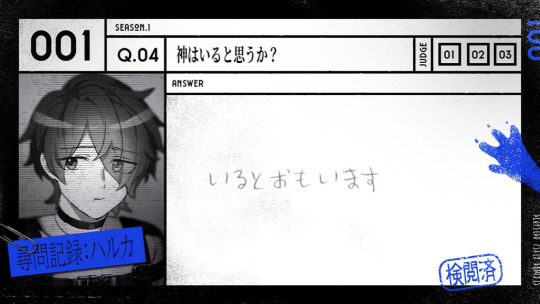

All of these improvements are able to be linked back to Muu (both his style of writing and in the more complicated words that he knows), who we know is looking after him. Considering this, it’s pretty clear why he sees her like a maternal figure.
One of the Minigram comics shows the prisoners eating curry udon together. Of the four shown (Amane, Haruka, Shidou and Mahiru), Amane and Haruka are the only two who make messes out of their clothes. Since the other two characters in the comic have active roles, and Haruka has the most passive one, Haruka’s inclusion can be assumed to be because he is the only prisoner aside from the child, Amane, who would make a mess while eating.

Childish themes and imagery are seen scattered throughout his MV, as well, especially his first one. He draws with the skill level of a child, which is a very prevalent motif, and he is shown to sleep with a plushie.
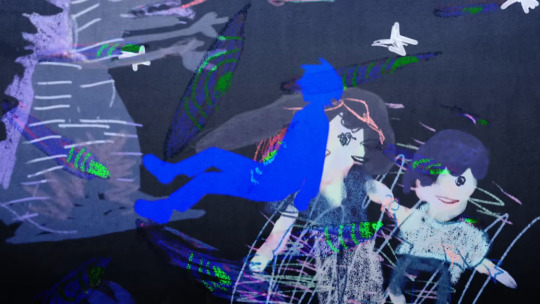
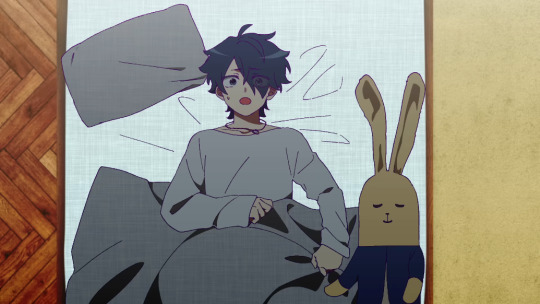
Additionally, he seems to have trouble putting on his clothes. He wears two entirely different socks – not just different colors, but also two different lengths. His pant legs are also two different lengths when he tries to roll them up in his Trial 2 art, and he seems to exclusively wear slip-on shoes up until he befriends Muu (where we can presume that she begins helping him, and even then, they're not done properly).
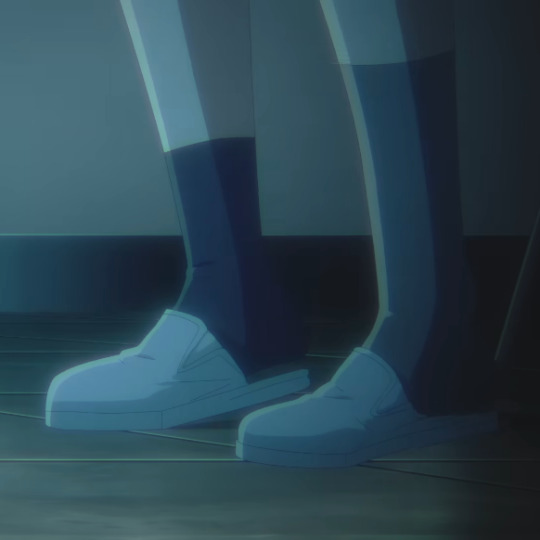

There are various visual parallels drawn between himself as a child and himself as he is now (for example, the way that his clothes are a mix of his current shirt and the vest he wore as a child in All-Knowing and All-Agony), and he often compares himself to a child wanting praise.

Even the violent acts that Haruka is shown committing are also a sign of an ID. People with IDs tend to have meltdowns, and devolve into fits of violence. The reasons for these meltdowns vary depending on the person, but reasons can include anger / frustration (especially in reaction to not being able to communicate well), sensory overload, and confusion.
You may note that Haruka’s mother reacts the exact wrong way for dealing with these meltdowns. When trying to help someone experiencing a meltdown, especially a violent meltdown, the last thing you want to do is appear frightened. The number one piece of advice everyone gives for helping someone experiencing a meltdown is to remain calm. It’s also not advised to leave the person alone, either, because that sends the message, “I want to avoid you when you feel this way.” (Which I suppose, for a neglectful mother like Haruka’s, would be technically accurate, but still not at all helpful.)
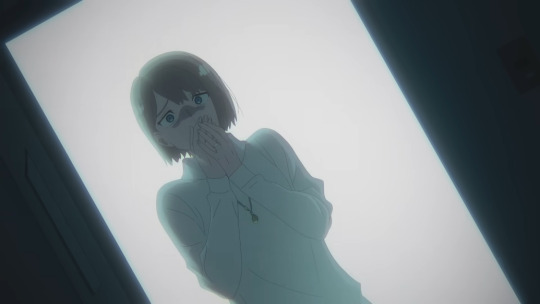
It only makes sense that Haruka’s tantrums continue to get worse and worse.
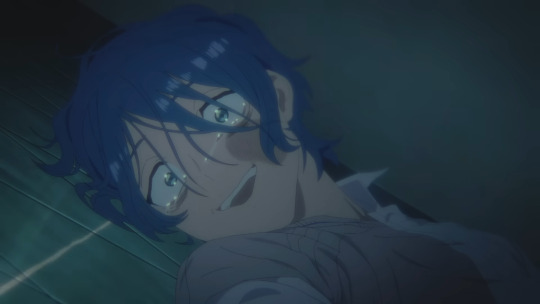
But after the meltdowns fade, he seems to not understand what he’s done. He’s shown experiencing fear and confusion after he hurts something, even shown as his child self at one point. A major part of IDs is being unable to connect actions to consequences.
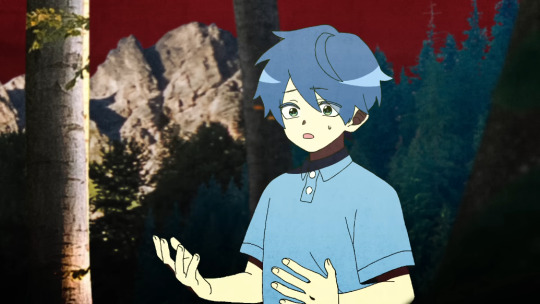


Finally, we go onto his body language. Frankly, I considered putting, “Imagine this as a real person doing these things and not an anime boy, and you’ll see my point.” Which is true. But I decided to go a little more in depth.
Swaying is heavily associated with people with IDs. This is, in part, because people with IDs have reduced postural balance, and general body balance. Because of that lack of postural balance, people with IDs tend to slump quite heavily, as well. Both of these traits are shown very obviously with Haruka, in All-Knowing and All-Agony.

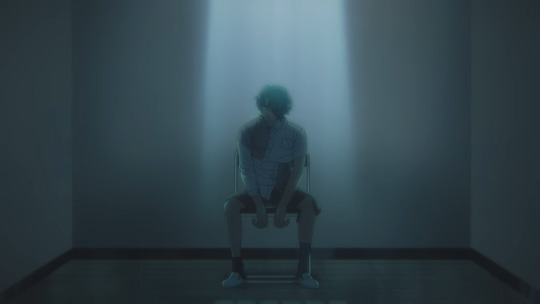
In the same MV, he’s also shown biting his nails. Like autistic people, people with IDs stim, and this could also be a version of hand mouthing (repetitive contact between the hands and the mouth / tongue), which is also heavily associated with / often seen in intellectually disabled people. He's also shown doing this in promo art.
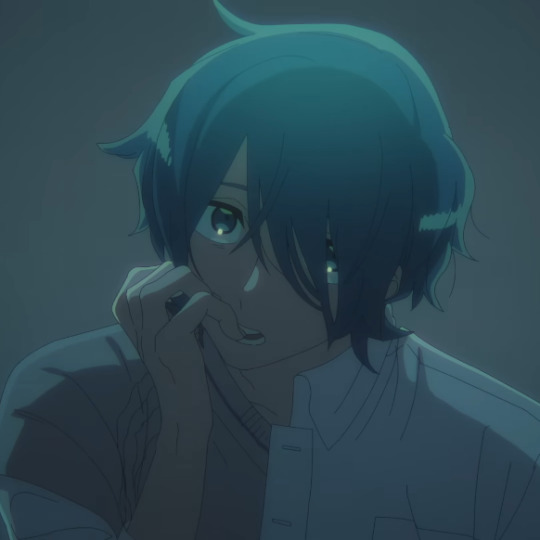
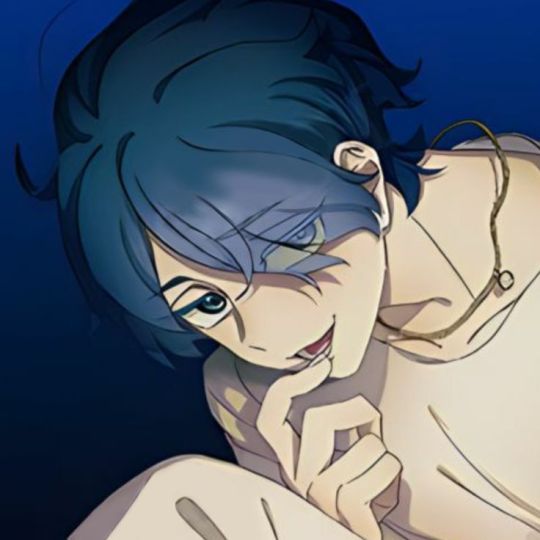
So, why does this matter?
Haruka being intellectually disabled is a huge part of his story, and, when taking it into consideration, it changes how one views his story a lot.
Haruka being treated better as a child makes more sense with this framework. He wants to return to when he was a child because his level of intellect then was seen as more ‘normal’. There wasn’t as much obviously ‘wrong’ with him yet. Children are expected to be a little slow, but it’s when they remain that way that many parents begin to become concerned. He yearns for when his mother didn’t know he was disabled, and when she treated him better for that reason.
Haruka being severely neglected / abused by his mother would be awful, no matter what, but him being intellectually disabled makes it so much worse. He needs attention and care from his caregivers even more so than the average child does, because he has trouble even functioning on the day-to-day without help. This is why he thrives under Muu’s care; she is meeting his support needs. Likely not perfectly (she’s just a teenage girl, and she is almost certainly not trained or educated in this regard), but even with the amount of support that she is able to give, Haruka is thriving. He’s more confident, he’s learning how to write, and he’s eating more consistently.
Without that care, he struggles so severely that he melts down regularly, going into fits of violence over the fact that his support needs aren’t being met (on top of all of the other emotional baggage that comes with any child being neglected by their parent). Haruka’s mother continued to ignore these cries for attention, for help, for care… Until it went too far.
The way that Haruka’s story is viewed changes drastically with this information. If Haruka was autistic, it would affect very few of the things that I listed. So much of Haruka's story hinges on specifically his intelligence level, not how he socializes. And do you have any idea how many people I’ve seen say, “He’s a neurodivergent with a shitty mom, but so am I, and I didn’t kill anyone about it”? No. If you are not intellectually disabled, you do not get to compare your experiences as if they are equal. If you don’t have an ID, your experiences cannot be compared in this way.
Haruka has a debilitating disability that requires support which he was not getting. He was experiencing ableist abuse at the hands of his mother, and he didn’t know how to handle it. All of his violence happened during his meltdowns, and his disability makes it harder for him to connect his actions to the consequences, or find alternate ways to solve his problems – this is all extremely important information and context when you’re discussing whether or not his crime is forgivable.
If you still don’t forgive him, that’s alright. But to neglect this aspect of his character is, to be frank, baffling, if you’re trying to participate in the spirit of the series and understand everyone’s crime to the fullest extent. And to make jokes, comparing your own experiences to Haruka’s, since you assume him to be neurodivergent and nothing else, does a huge disservice to his story! And, when it’s done to demean him? It honestly comes off a slight bit ableist.
So, I’d like everyone to keep this information in mind moving forward. Don’t infantilize Haruka for his disability. But do consider this information in your analysis posts, your discussions, and so on. I’d like to see this become common knowledge in the MILGRAM fandom, especially since the idea of him being specifically autistic-coded is so widespread by this point.
Thank you!

#haruka sakurai#milgram#the milgram project#milgram meta#milgram analysis#intellectual disability#haruka#sakurai haruka#azure does a thing
345 notes
·
View notes
Text
How Magic Depicts Pain
(also known as: I told myself to hold back on Amaneposting but the new process shots have made me think)
So in-universe, Magic is a watered down and sanitized version of what actually happened in the cult that switches between from Milgram's usual anime artstyle to a papercut/felt-like storybook one. The general tone of Magic is very high energy and happy. It's a very colorful MV all around.
This doesn't stop the darkness from seeping in of course, most notably in the lyrics and at the end of the MV which involves a stylized depiction of abuse.
I'll get to that part, but before the ending of the song we get two showcases of pain.
The game show scene:
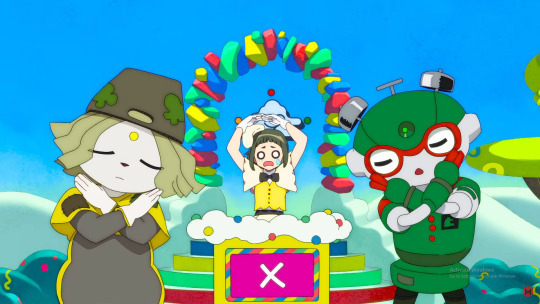
And the stage light scene:
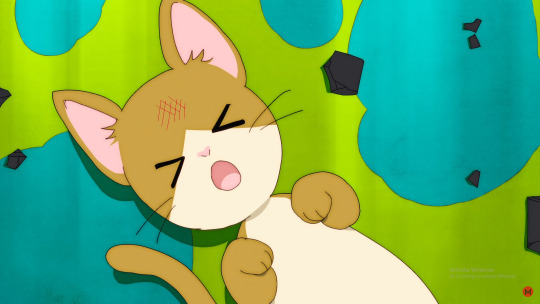
We will get to the stage light in a bit but let's talk about the game show first!
The metaphor isn't subtle. Amane messed up, she said the wrong thing, made a mistake, and so, she gets punished.

It's not treated as anything too serious though, Amane makes silly cartoonish facial expressions, her movements are over exaggerated and silly. It's comedic, it's nothing to be taken too seriously.
Even afterwards Amane gets helped up by (presumably) Yuri, you don't Have to worry. It's all fine and good and not that serious, and even if it, was the two of them help her up! It's a perfectly fine situation with nothing dark lurking under the surface that might suggest otherwise.
Now since the Milgram MVs are taken from the person's mind, most likely, Amane is downplaying the severity of the abuse done to her. Not only that but she's portraying her own pain as an exaggerated and comedic reaction to it. It's not that serious, she's just overreacting.
Amane does this a lot throughout the song and in outside material, she tends to downplay to abuse or explain why it's actually a good thing.
But it’s not scary at all, because it’s love
I can really think it’s great. See isn’t it a great thing?
Amane Momose Does Not Consider Her Own Pain as Something Serious, or at least when it's pain caused by her abusers.
Moving out of the gameshow and into the stage light, the cat's pain is treated in a similar way at first. The scene even directly parallels the game show scene:
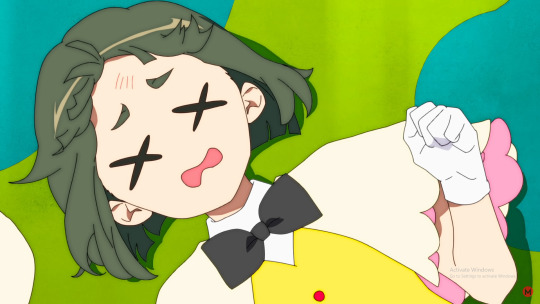

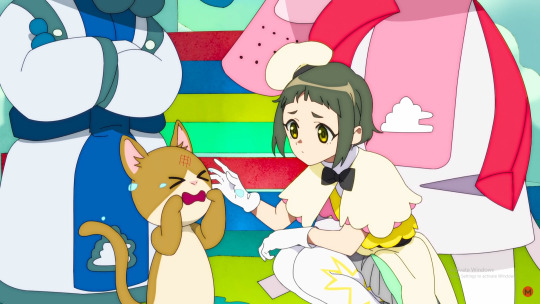
Like with the game show, the reaction to the pain is depicted as something childish, a tantrum over a small scrape, nothing that really needs to be fret over.
Until we switch over to Amane's View:
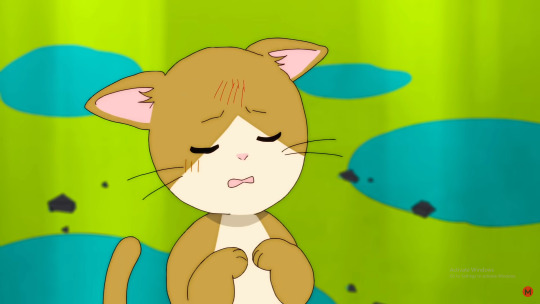
The camera is shaky, the cat isn't crying but hyperventilating. It's still a scrape but instead of the exaggerated criss cross, its a row of scratches on the cat's face, there's even a few on the cat's cheek. It's depicted seriously, there's actually weight to the injury here.
Now, what does Big Sister Amane do? Big Sister Amane who Yuri (after Gachata hurt her) helped just a few moments ago? Big Sister Amane who wants everyone to be happy?
She helps.

She grabs a first aid kit, I don't know How she got it but she does and she does the best she can to to fix the cat up. She's hiding away as she does this, she knows she isn't supposed to but she does it anyway because it helps someone!
And it works! You can see how happy the cat looks in the image. It's not just a vague "we will support you" gesture like the hand Yuri gives Amane. It's an actual tactile action that Helps Someone.
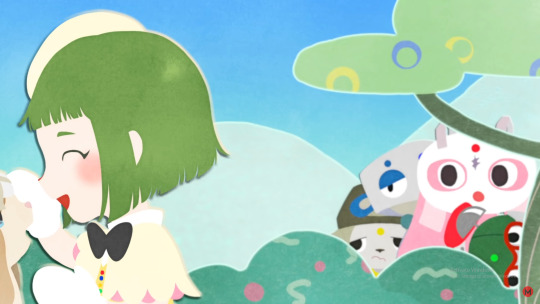
And they can't have that. They can't have Amane help someone out like this.That's against their rules, that's against their beliefs, that's a threat to their control.
So they punish her.
Let's talk about the ending scenes, and the possible torture that Amane went through.
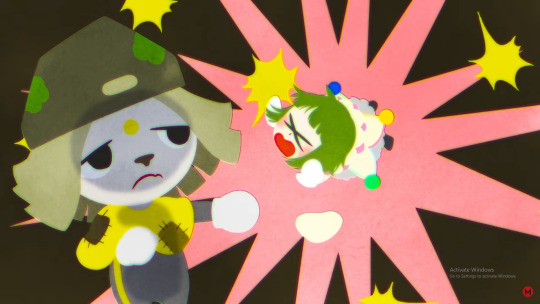
I'm not going to show all of them as that's a whole other post on it's on really, but it's notable that, the most egregious acts of violence and abuse in the entire MV, are sanitized. There turned into storybook images, Amane has exaggerated and cartoony expressions, the mentor figures are far away from Amane and are standing to the side as she's getting hurt.
We know from the process shots that a taser was involved and yet in Magic it's depicted as this:

It's...still bad, it's still depicting electrocution, however instead of a taser being used against her it's an abstract electrical burst. Even now there's a distance between what actually happened and what it shows.
And yet the pain still comes through, even with the storybook visuals, it's not the same as the Game Show where it was turned into a finger flick. It's still depicted as something Painful, just distanced from reality.
It transitions back to the regular art style after Amane prays, or more accurately, begs, that she can be better. She's given a wand (pipe) and wings and is told that yeah she Can be a better girl!
Not that she's already a good girl, only that she can be, eventually.
And, after all, aren't good girls supposed to have hope no matter what?
(End Notes: I hope people like the way I formatted the screenshots lol, I had a lot of fun with it so I hope it flows well!)
#milgram#milgram project#amane momose#008#milgram amane#milgram meta#milgram analysis#I still dont know how to tag these#cw cults#cw child abuse
231 notes
·
View notes
Text
i love milgramblr bc amane is treated so much better here than anywhere else :). go to youtube or twitter and ppl are talking about how she needs to be kept restrained for the safety of everyone else. and how she shouldn't be let back into society because she hasn't learned that she's in the wrong yet and how she will probably kill again. and how she's a hopeless case and can't be helped so might as well vote her guilty. and how she's a good example of what the irl milgram experiment was trying to show (smites that commenter to hell forever a thousand times over and over again). and how she's selfish and unreasonable. and how she--
67 notes
·
View notes
Text
attempting to explain why mahiru did some things wrong actually
the "mahiru and her boyfriend were equally toxic" theory makes me want to become the real life joker so im going to talk about why i think it's Not the case and why i actually think it detracts from her character!
first of all, i think there's a massive difference in the way her boyfriend's affection is portrayed and how mahiru's affection is portrayed.
people cite the fact that he was feeding mahiru cake at the beginning (which later turn into rats when mahiru feeds him) as proof that he was also toxic. but i don't think the cake was Always rats and thus does not inherently represent toxicity - i believe it represents attention and/or affection. the way that the two scenes are portrayed are COMPLETELY different, in my opinion.
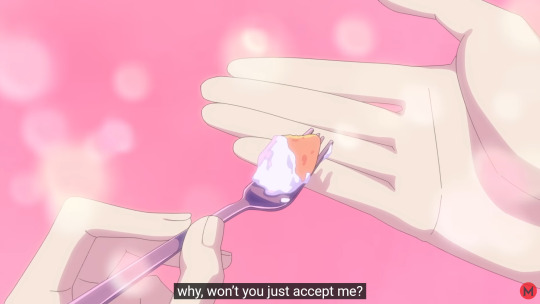
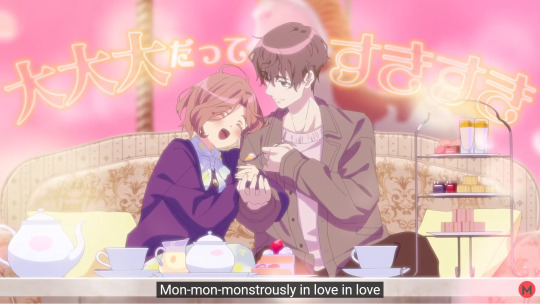

here, mahiru's boyfriend takes a small portion of the cake and holds it out for her to accept. he's waiting for mahiru to take the cake, and is not forcing it upon her. he tilts the fork towards her, and she happily moves towards him to eat it. he's fairly reserved compared to mahiru, but the portrayal clearly shows like.. a fairly balanced and loving relationship? he's waiting for her to reciprocate, and doesn't force anything upon her.
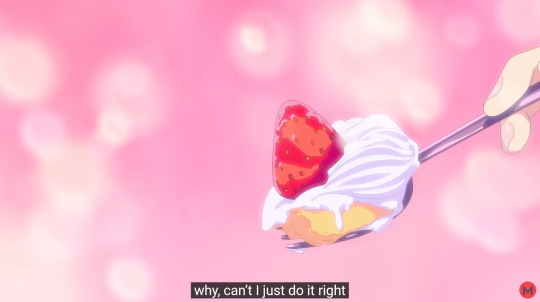


now, look at mahiru's portion of cake! it's big, it's got lots of frosting, it's got a nice strawberry on top - you can barely even see the fork! would this not fit mahiru's overwhelming style of love? if the cake is meant to be affection, then you could argue that her boyfriend was reserved in his affection, while mahiru (in true mahiru fashion) was overwhelming and indulgent. she's also making the move to feed her boyfriend the cake in the last shot when he is... very obviously Not reciprocating, unlike in the first shot where she is moving in to meet his fork.

i think the infamous rats are just a portrayal of how mahiru's love has become actively toxic. the fact that he looks sunken and is actively backing away from her does NOT change even when the scene flickers to the idealized version where mahiru is just feeding him cake. there is no reciprocation here, nor any illusion of reciprocation. he wants out, and mahiru is not letting him take that out. he cannot leave in this situation.
secondly, from a storytelling standpoint: what does mahiru being in a mutually toxic relationship add to her character? what purpose does it serve other than to make her seem less at fault for her crime? what does it add to the narrative?
mahiru's character is built up in a way to contrast her actions and her behavior. just look at the way she's portrayed in both trials! she's the ditzy lovable big sister in the first trial whose even described as someone "pure", and in the second trial they pull out ALL the stops to make you pity her as much as possible. they make her frail, on the verge of death, still clinging to her reason to living even as it's been crushed helplessly. they are doing EVERYTHING to make you see her as innocently and as pitifully as possible.
so, what's the point of that framing if mahiru didn't actually do anything wrong? if mahiru was a victim in her relationship as well, and if her boyfriend was treating her badly the whole time, then like... what, is she just meant to be a punching bag, or something?
mahiru is sweet and naive, and she is ALSO a person who did horrible things. she is kind, she is loving, but she drove someone else to suicide. those two aspects of her are not mutually exclusive, and the contrast is in fact what makes up the core of her character and conflict. if you shift the blame off of her, then what is mahiru's story meant to tell us? there's no intriguing dissonance between her behavior and her actions anymore! which conflict sounds more thought provoking to you: "can you forgive an otherwise kind and loving person for leading an innocent person to their death?" or "can you forgive this poor woman who was being abused without even realizing it for loving her abuser too much?"
thirdly, the theory just reeks of victim blaming . dear LORD i know her boyfriend was mid as hell but that doesn't mean he deserved what he went through somehow!! he is DEAD because of mahiru's actions !!!! "he was toxic too, so mahiru wasn't fully to blame!" mahiru is not the one who is dead here! mahiru is not the one who thought death was the only way out of the relationship! he didnt deserve this!!
in conclusion: i just think that, mainly from a storytelling standpoint, it simply doesn't make sense. it robs mahiru of all of her interesting and complex traits to make her seem more palatable and innocent. mahiru was flawed and toxic and did horrible things? nope, actually she was always a good person she was just mimicking her horrible boyfriend's behavior and he simply couldn't handle that! so glad that she is now the character equivalent of Plain Oatmeal and we can all rest easy knowing that she's never done anything wrong in her life ever ^_^
also don't even get me started on her views on kotoko. its soooo interesting how she views her but people just boil it down to "wow, she's a saint, she even forgives kotoko for attacking her!" when it's sooo much more fascinating than that but ive rambled on enough . That is not what this post is about . goodbye o7 never ask me for anything ever again
(disclaimer though, if you want more milgram analysis im Not the right person to follow for it . im an enstarrie who reblogs propaganda for my fave character 48 times a day. i dont even like mahiru at all shes my least favorite milgram character i just like analyzing her so dont follow me for more posts like this o7)
#melty rambles#milgramposting#milgram#milgram meta#mahiru shiina#sorry . I unwillingly rotate her in my brain because the fan perception of her makes me so so mad
88 notes
·
View notes
Text
Those images in Undercover
Okay someone stop me if yall know this already but. i did see someone wondering about it (in relation to another, cooler theory). Those still images in Undercover
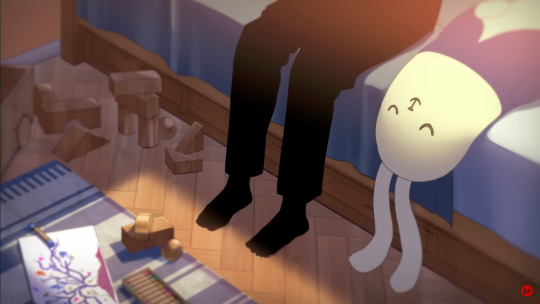
these. ive seen people trying to match the stills to each prisoner (i believe ive seen several folks attribute this one to haruka)
i haven't quite cracked the code on it but i found something while rewatching undercover in 1080p60 as one does
see this?

reflected in the quick shots of the prisoners is part of the still image (with haruka here it is the same as what i have copied up above, seeming to confirm that this still belongs to him)
this is going to get long due to the images but let's try and spot the matches
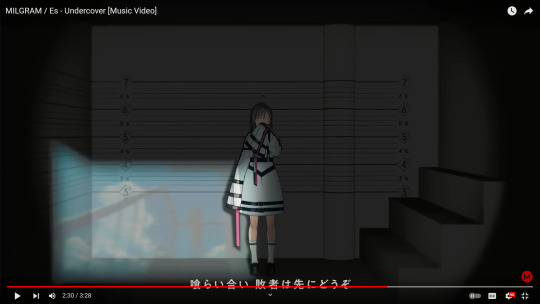
Yuno's is also fairly evident already- it's this shot of a girl on a balcony

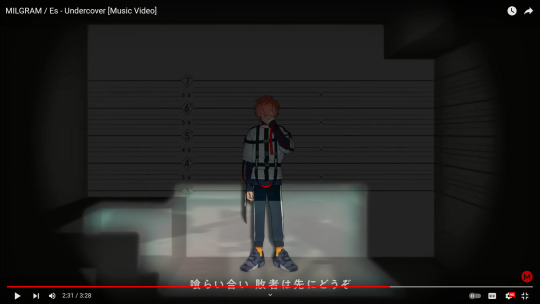
fuuta's is a little harder, but between existing speculation and what i'm pretty sure are hands in this image im going to call it this still
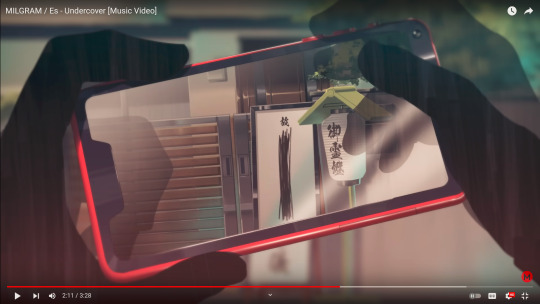

muu's also seems clear- pretty sure those are desks in the reflection and only one still has multiple desks
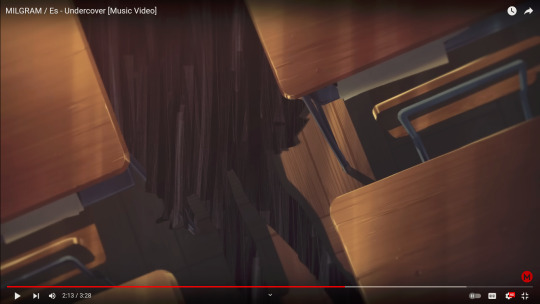

shidou's is hard because this bastard (affectionate) has his reflection all on the white background but i think i see some kind of pen or scalpel (something with a long and narrow handle) and that seems to match

...this one. which is also the most terrifying one so far, thanks shidou i hate it.
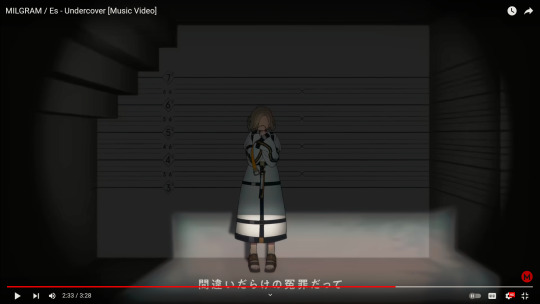
never mind shidou being hard to determine my sweet daughter mahiru is completely incomprehensible (which is also how i feel about her normally). the only thing i think i see is a somewhat spiky shadow in the corner. she's maybe this one?
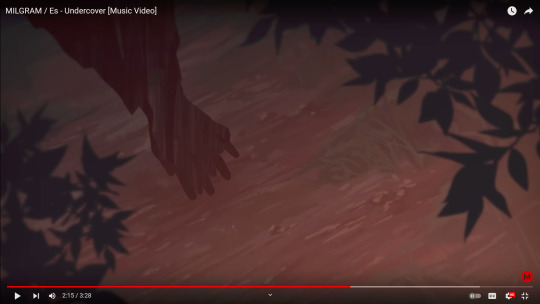
but i'll be real I just picked it because of the folded hands seeming like a Mahiru Thing (and as you'll see, process of elimination)
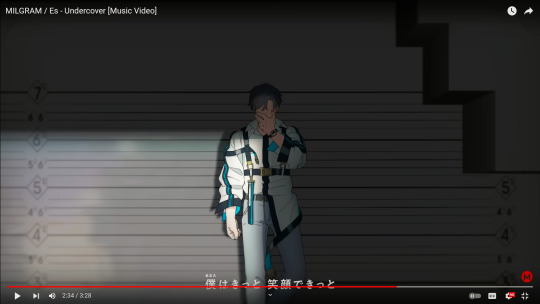
kazui is also hiding from us but i can see a color pattern in the reflection which makes me think

see? same dark bluish-purple on top and orange shade on the bottom.
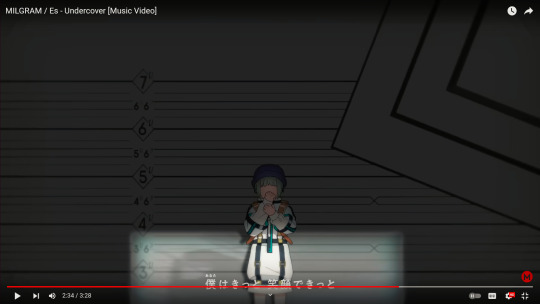
amane's is hard because she is so tiny and her reflection is sized accordingly but i do think that's a hand at least which should help

that looks like a hand curled in approximately the same manner
that just leaves kotoko and mikoto which. i'll be real. theyre pretty obvious bc of their haircuts but i'll include them anyway.
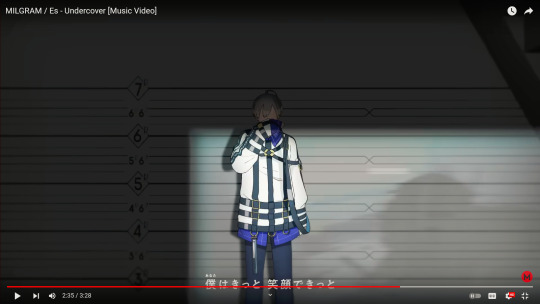
wow i wonder who this is surely not the office worker with fluffy hair
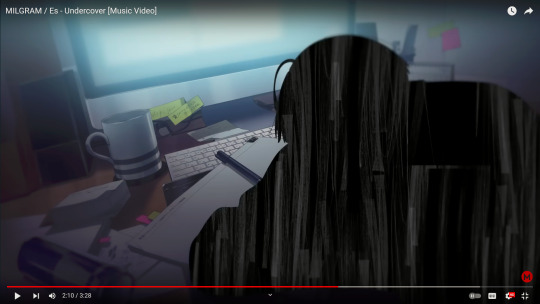
also yikes mikoto is overworked someone save that boy (not you orekoto i love you but its not working)
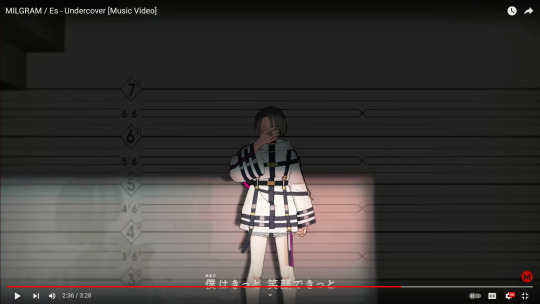
again, the sharp bob(?) makes it pretty obvious. also pretty. kotoko i want your style

if you stayed here this long conga rats. also give amane and shidou hugs for their terrifying still images
#milgram#milgram theory#milgram analysis#milgram undercover#milgram meta#im gonna feel so dumb if someone has done this already
42 notes
·
View notes
Text
scattered mikoto thoughts
since mikoto has been (FINALLY) canonically confirmed to have dissociative identity disorder, i went back and rewatched MeMe again. i have some thoughts i haven't seen come up yet in fandom circles. please humor me!
one: i am starting to believe that the odd space with the water and broken walls in MeMe is mikoto's headspace - which is a common way for people with DID to describe who is fronting and who isn't, among other things.

he seems confused the first time he appears here, still indicating that he has no clue that he has an alter in the first place. the lyrics say he "believes it isn't happening" or "it's just a dream" - this is pretty obviously connected to his wholehearted belief that when he's not fronting, he's just asleep.
i like to think of the mirror and the walls as similar to his bathroom, one of the few places he can see his reflection.
two: someone around here brought up the fact that mikoto is left-handed and john is right-handed. and therefore it's easier to tell in imagery who's fronting by watching the dominant hand of activity. it was more noticable in double, but in MeMe you get two very specific shots:

this has to be john at the very beginning, since he's being very aggressive.
and later on, at the very end of the video, the POV (mikoto) is being handed the death tarot card, upright. in tarot, this is usually indicative of transformation and change.

left hand (mikoto) takes card, turns it around.
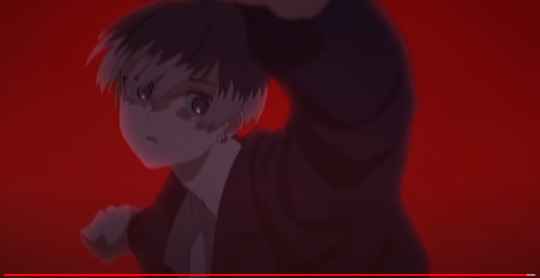
this at the end is probably john, going for a right-handed swing. mikoto obviously doesn't want to acknowledge the fact that john exists, but john sees his violence and force of retribution as a protective, persecutory act.
here, he's probably just angry that mikoto is not acknowledging his inner pain after being dogged by work so much - a request, however angered, for him to change his ways before it gets worse.
in fact, a lot of double is just indicating that mikoto is starting to actually realize john exists and what john has done - the murders - is hurting his life, dreams, ambition ... which is why john has apologized to him.
this is my first time making a meta post for MILGRAM, so please let me know your thoughts!
16 notes
·
View notes
Text
I think my most meta milgram theory is that all the prisoners relate to social issues in Japan (this was brought up by my friend but they don't have tumblr so I'm gonna post it here)
Haruka- ableism, specifically against learning disabilities. Haruka's story is all about how he was born "wrong" and how his mother didn't want him
Yuno- the abortion debate
Fuuta- online harassment and cancel culture
Muu- bullying, and how in social structures someone always has to push someone else down to be on top (the whole hourglass metaphor)
Shidou- curroption in the organ donation system, and how brain death is viewed in Japan
Mahiru- societal expectations of women, and the pressure to marry
Kazui- okay so since his crime is vague rn, either A. Cheating or if gay kazui theory is correct B. Lgbtq issues, could also be japan and it's issues with intimacy and how his wife felt unloved but he didn't realize
Amane- Japan and its history with cults
Mikoto- ableism against the mentally ill, and the "just endure it" view of mental illness in Japan which makes alot of people reluctant to reach for mental health help. It's probably why Mikoto seems to not realize he had DID or OSDD
Kotoko- curroption in the legal system, and how crime against women and children are often ignored by the police
#milgram#milgram analysis#milgram theory#i think this is meta#yuno kashiki#shidou kirisaki#mahiru shiina#kotoko yuzuriha#haruka sakurai#kazui mukuhara#fuuta kajiyama#muu kusunoki#amane momose#mikoto kayano
1K notes
·
View notes
Text
Everyone so far seems to be theorizing Amane’s victim as her dad, her mom, or an unnamed child also in the cult. I’ve got my own theory - it was Gozake.
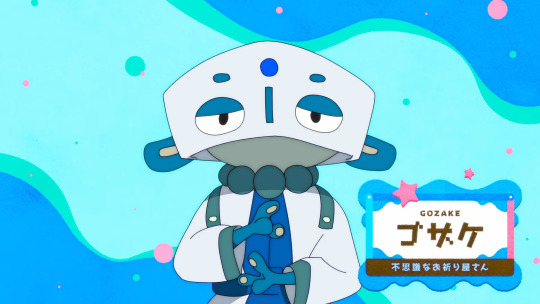
That’s Gozake, from Magic. The blue guy. He’s one of the four main figureheads of the cult, and possibly a music teacher of some kind to Amane, conducting her to sing in Magic. The very first shot of The Purge March is Amane playing the drums.
The mindscape Amane’s wield flags representing the four cult leaders (teachers? elders? propaganda peddlers? high up members? whatever, important cult people), but Gozake’s flag in particular is given special attention.
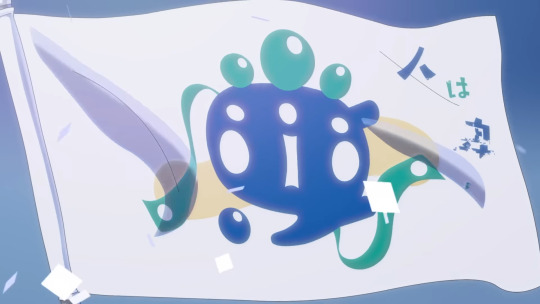
Same color scheme, same three dots over a narrow rectangle like design, same ear thingy to the side, same orb-like design features - that’s Gozake. Before we see it flying though, we see it crumpled up on the floor by Amane’s feet, something not true for any other flag.
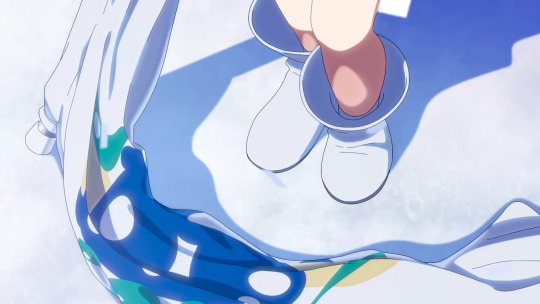
We then see an Amane messing up her flag routine, dropping Gozake’s flag in particular and falling over. The other Amane looms over her, preparing to punish her for a failure related to Gozake. Once the punishment starts, rain pours down.
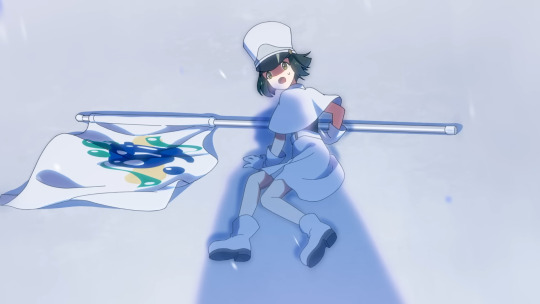
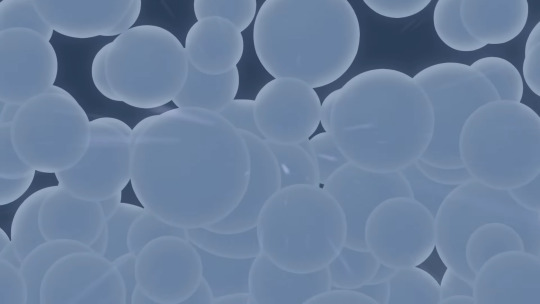
Then, the punished Amane begins to drown. You can even see the flag while she’s sinking.
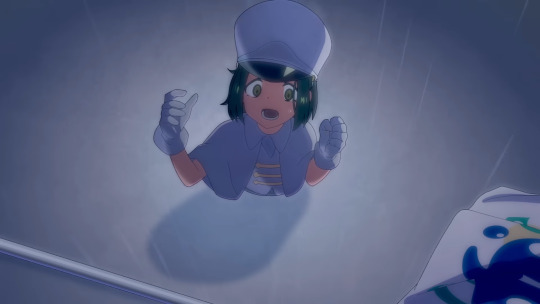
She drowns further, and we get another shot of just the flag, lying on the ground, and then the drowning Amane reaching up towards it. She’s reaching toward Gozake, the one responsible for drowning her.
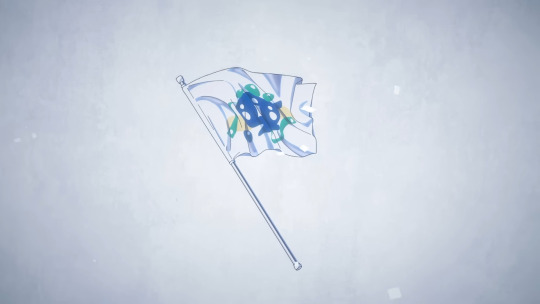
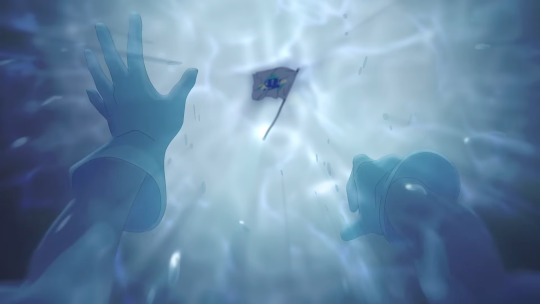
And he is the one drowning her. We see it directly in Magic.
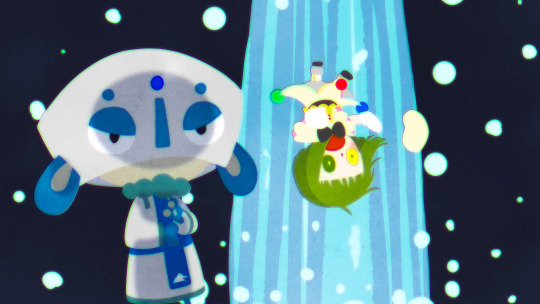
It cuts to the real world, with Amane actually being drowned, and her placed below the one drowning her like she is placed below the flag.
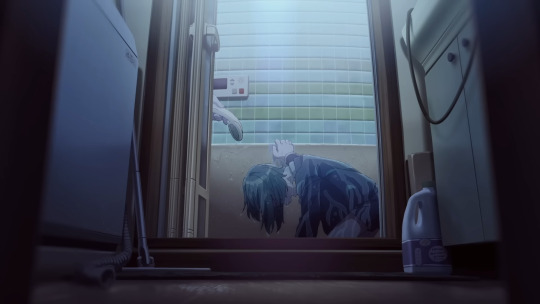
Take note of the framing, with one hand stretching from out of frame.

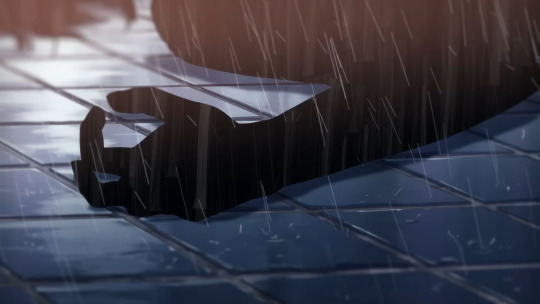
I can’t find a better picture for her undercover card, but her location shows a bathroom. Undercover also has a shot of a victim lying on a blue tiled floor (we can’t see the floor, but the shower in Purge March has blue and green wall tiles) with water coming down. Blue and water are representations of Gozake (Amane’s character color is aqua), and it’s framed as a single hand stretching out while the rest is (mostly) obscured, and takes place in the bathroom (or at least a bathroom) that Amane was drowned by Gozake in.
Throughout the MV, there’s a lot of blue, too. Amane’s school uniform is blue, the cloth she heals the cat with is blue (the cloth later becomes bloody, another thing representing Gozake being damaged), the sky and general background and lighting is blue. Symbols of Gozake are present everywhere in the MV.
The suit man with the briefcase could be Gozake, I’m not sure. Gozake would fit the profile - a cult member, adult male, disapproving of medicine, willing to put Amane in harm’s way - but I don’t have further evidence.

Before Amane goes all in on the cult’s doctrine, she has an umbrella, but it’s unopened. The baton she uses to kill and to represent her as fully converted and the opening umbrella are overlayed.
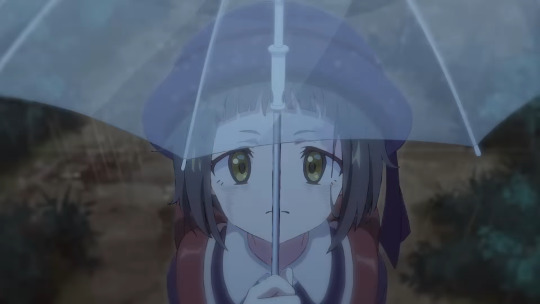
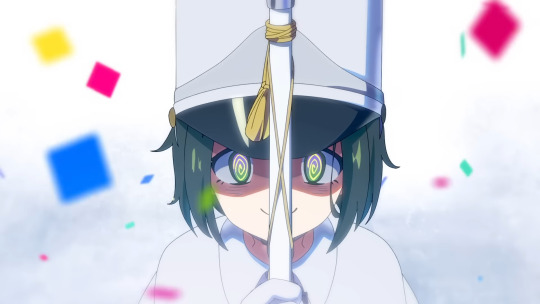
The lyrics show her motivation for the murder, as both a means of protection and revenge. She’s been horrifically abused for years, and has taken on the role of the punisher to avoid being the punished.
“It’s my turn to tear you apart / So there is no second time, I’ll give back the judgment that you gave to me / It’s now your turn to say that hopeless “I’m sorry” / You’re sorry? I don’t care! / Please, go ahead and die already / Remember MY cries, MY repents, MY words of “I’m sorry” that I said to you?”
Beyond showing a lot of resentment and disdain for the one she’s speaking to - her victim - the phrasing clearly shows that she’s not just punishing a sinner, she’s turning the tables. She’s returning the favor to someone who’s been violent to her in the past.

The umbrella is symbolically her murder weapon and what she uses to punish others, but also literally and obviously a tool to protect from the rain. What she uses to kill is what protects her from Gozake. She can’t take the abuse anymore and tries to become the cult sanctioned violent avenger that’s hurt her so many times. She can’t be the victim if she’s the perpetrator.

The final shot has her over the corpse, having tracked in water from the rain. The puddles lead right to it and the framing is the same as both the Undercover victim and the one drowning her - a single hand, reaching from out of frame.
Amane killed Gozake.
#illia original#milgram#the milgram project#momose amane#amane momose#gozake#the purge march#magic#theory#meta
579 notes
·
View notes
Text
also also. remember! Milgram mvs are based on the prisoners' perceptions. It's easy to read Kotoko's stance on the other prisoners from her view on them as pawns, but what does that mean for her, who sees herself as a dangerous beast who kills those lower than her?
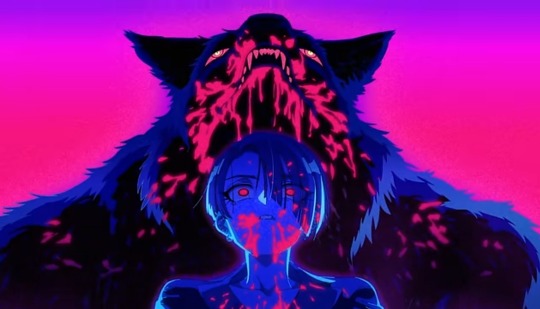
Yes, they are lower than her.. But she's still covered in human blood, a genuine monster with sharp teeth and a horrifying appearance. She sees herself how the little girl in orange saw her: A dangerous stranger. She wants to save the world, she wants to erase evil, but she's also afraid of herself and what she's become. She's terrfied of what that means. But it's too late to turn back.
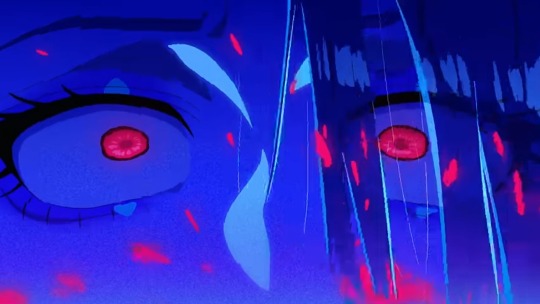
She's going to save everyone even if it costs her her humanity.
#prisoner's ramblings#milgram#010#meta#im having some thoughts. i was disappointed by the lack of story details for the mv but i feel#its emotional depth somewhat makes up for it#we saw her turning into a beast in harrow but it almos looked like she was enjoying it#but now we also see this other side of her which i like
320 notes
·
View notes
Text
We Need To Talk About Mahiru
Mahiru's second Trial is out and oh my god she just jumped up on my faves list. I love analyzing the MVs from different perspectives so I thought I'd give my 2 cents on Mahiru's character.
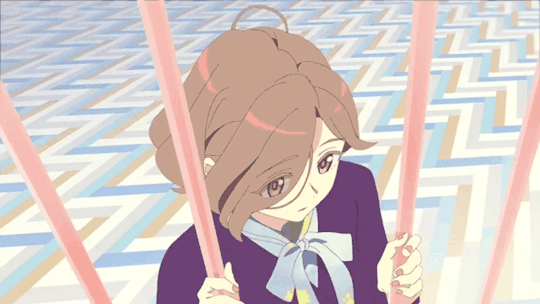
My vote: INNOCENT
The first thing I really feel the need to bring up is that people tend to ignore that Mahiru is actually very intelligent. There's multiple kinds of intelligence, and while she might not be "traditionally" smart in the linguistic sense, she's incredibly emotionally intelligent. She's a master of empathy and mood making and is an incredibly charming talker to the point you don't realize she's completely controlling the conversation. That being said, I genuinely don't think she uses her intelligence for malicious gains.
One of the theories going around with her first MV was that she was overbearing to the point of being abusive, while being oblivious to her own toxicity. Now after rereading and rewatching, I'm inclined to disagree. Her love may be seen as overbearing to some but we have not seen any explicit bad behavior towards her boyfriend. (Contrast with someone like Muu, who was revealed to have bullied as much as she was bullied herself). In my unpopular opinion, I genuinely think Mahiru was in a "healthy" relationship, at least on the surface.
[TW for discussions of death, murder, and fictional depictions of suicide]
[Side Note: One of the sticking points people have while saying "Mahiru was toxic" is that "Mahiru's relationship only lasted 16 days" which is blatantly not true when you check the translations for MV1. Day 1 takes place during college finals (mid-March-ish in JPN), Day 7 explicitly takes place in the summer, and Day 15 is New Year's Day (January). Mahiru's affection towards her boyfriend lasted almost a year, and they dated for around 6 months-ish during that. The "16 Day Memorial" isn't about a period of 16 days, it's about 16 days over the course of their relationship where she was explicitly making moves towards her boyfriend.]
I need you to take a real hard look at how Mahiru talks about "love" and "being in love." More specifically, when she talks about the concept of "love," she often brings up the action of "loving/showing love" in her explanation. Never once have I heard her say "My boyfriend loved me." or "This is what my boyfriend did for me." The focus is all on her actions towards the boyfriend. And I genuinely think she was a sweet girlfriend! She loved trying his hobbies and cooking his favorite foods and going to his favorite spots. She was sweet, and kind, and playful, and maybe just a bit clingy. But she was never jealous or possessive.
Es: I see. So, you became a murderer as a result of some relationship conflicts? Jealousy… Grudges… Having your partner stolen from you… Those stories aren’t all that uncommon now are they?
Mahiru: You’re wrong. It wasn’t that. I…never even wanted to kill anyone in the first place!
She explicitly states that her crime was not based off of negative feelings towards her boyfriend, but she still takes responsibility for what happened. Compare that to Fuuta, who, despite his own feelings of guilt, continually verbally denied that he had anything to do with his victim's death. Mahiru not only takes explicit responsibility, but also pins her "love" as his cause of death, to the point where if she was voted guilty, she would never try to love anyone again. Without "loving" anyone, she has no reason to live.
"To not forgive me means to take the act of loving away from me. That’s the same as not being alive. It’s the same as not being able to drink water or breathe."
It's interesting the way she compares basic needs to "the act of loving". Not the concept of "love" itself, but the act of showing someone love. If she is not allowed to show someone love, to her it's like suffocating, like dying of thirst, or maybe...dying of starvation?
Mahiru in her second MV may be dirty and barefoot with torn clothes, but the one thing she is not is starving. You could argue that "perhaps it doesn't show," but when compared to her boyfriend...

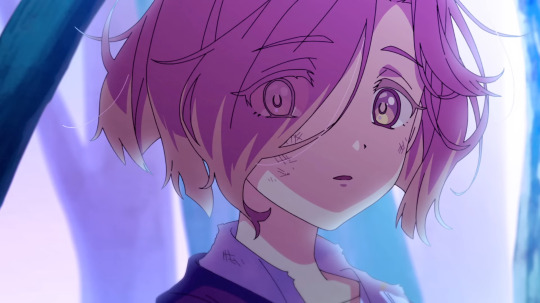
She's incredibly healthy.
And of course she's healthy! Her lovely boyfriend's been feeding her those bites of cake! So is the cake "love" then? But if the cake is love, why is her boyfriend, the one whose being "smothered," the one starving?
Feeding the cake doesn't represent "love." Feeding the cake also doesn't represent "the act of loving." Feeding the cake represents the boyfriend letting Mahiru "love" him. Does that make sense?
The boyfriend lets himself be vulnerable, he feeds pieces of himself to Mahiru for her to "love." But yet, he himself is starving.

...Have you even noticed Mahiru hates talking about herself?
It's evident from her first interrogation. Es can barely get two words in before Mahiru interrupts them to ask them questions about themselves or to offer her own advice to problems she thinks Es may be having.
Es: Oh… yeah. Uh… I apologise for that.
Mahiru: Did you zone out just then? This job must be pretty difficult, so you might be mentally burned out from work. Herbal tea’s good for that, you know? Oh! Like ginkgo tea—they say it helps improve brain function.
Es: Oh, is that so? I’ll try a bit then… I mean, no! Enough about me.
Compared to one of the few times Es gets a question in:
Es: I don’t completely understand what you’re saying, but… Being in love and loving someone—are they really that important?
Mahiru: They are.
Es: Hm.
Mahiru: They are… More so than anything else.
When reflected back to her, her answered become short and vague. Her voice grows soft and shy. She avoids questions, especially questions about difficult topics, not because she doesn't understand the gravity of them (like Haruka) but because she does. Like I said at the top, she's incredibly emotionally intelligent. She was beaten nearly to death because Kotoko decided to be Es's "fang", and yet she still empathizes with them. She still makes a strong attempt to see their point of view, and even to encourage Es to keep working hard. Compared to the other attacked prisoner we've seen, Fuuta, who blames and grovels for forgiveness, these responses are like night and day.
But what do we know about Mahiru, really?
She's 22
She's a university student
She likes romantic novels, comic, and dramas
She loves love. [But she's not obsessed with being loved. Haruka is obsessed with being loved, Haruka wants to be loved and taken care of, Haruka killed out of jealousy and for attention because he didn't feel loved enough. We never get that from Mahiru.]
Everything else we know about Mahiru? Is for other people.
Her favorite hobbies? Whatever her partner is doing.
Her fashion sense? Whatever will catch her partner's eye.
Her favorite food? Well, as long her partner cooks it, anything's her favorite!
The only time we ever get a sense of her and her boyfriend possibly disagreeing on something is Day 14 in MV1. Mahiru wants to see a French film and begs her boyfriend to take her. This is odd, because just a few scenes ago, she was bragging about how their tastes in films perfectly line up. If their tastes are the same, why would she have to beg him to take her to see this one?
Mahiru, like Yuno, is hiding behind a facade. But unlike Yuno, Mahiru doesn't have a strong core underneath her mirroring. Yuno can drop her "nice girl" act and she still has strong opinions and feelings and acts accordingly. Mahiru, when you try to go behind her mask, clams up, redirects, searches for a way out.

So. Back to cake.
The boyfriend feeds pieces of himself to Mahiru. He makes himself vulnerable, he lets her in, lets her care for him, lets her "love" him.
But Mahiru? She never feeds him until the very end, and even then, her "cake" isn't anything edible.

She's not stupid. She knows she can't give him what he really wants: any sort of vulnerability.
Their relationship is one-sided, but not because Mahiru is toxic or the boyfriend is apathetic. Their relationship is one sided because that's how Mahiru wants it to be. She wants to be the perfect girlfriend, because, if we're being honest, Mahiru doesn't like herself very much.
Why else would she hate talking about herself? She clearly loves to chat.
She puts her all into everything...as long as it's for someone besides her.
She will outright ignore her own pain and suffering, her own emotions, because she doesn't want to make anyone else upset.
Mahiru: Sorry… for making you worry. I’m fine! It doesn’t hurt at all.
Es: It’s a horrible injury. There’s no way it doesn’t hurt.
Mahiru: It doesn’t!
So why did her boyfriend die?

Mahiru's very good at hiding her emotions. If she slipped up and her boyfriend realized and noticed how she refused to love herself, it could cause friction in their otherwise perfect relationship.

Maybe Mahiru was the one who wanted to die in the woods, and her boyfriend, starved for any sort of real connection to her, found her at the last moment? Maybe her mental health dragged his down with her.
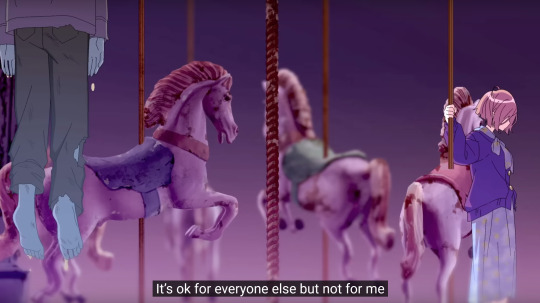
Mahiru's incredibly complex and tragic and endlessly relatable. She only loves too much because she can't love herself. If she's truly unforgivable, and she keeps her promise to stay alone...what's stopping her from killing the only thing she hates most?
#milgram#mahiru shiina#this is how to be in love with you#character analysis#i love you#daisuki#meta#deco*27#milgram project#mahiru innocent#i log into the milgram fandom#i post a 1.5k word essay#i leave for another 5 months#lux talks
329 notes
·
View notes
Text
Let's Keep It Simple: Power Dynamics in Milgram
(CWs: Ableism, Abuse, Bullying, Unhealthy Power Dynamics)
(This is partially me putting this post and this post together and partially a more cleanly written version of the ideas discussed in this reblog chain and partially additional thoughts after both.)
(Big thanks to: Tsuwmya, Tired-and-unslimed, Archivalofsins and Clownsalot for contributing to the original chain and making this thing much bigger than it would of been otherwise)
(Also big thanks to: Roseofcards90, 1moremilgramenjoyer, Tsuwmya, Tokyogruel and milgram-side-blog for reading this!)
When talking about heroism and the ideas associated with them, it's easy to focus on the altruistic and selfless aspects of it. The ideal of a brave hero selflessly protecting the innocent is an appealing one.
And there's nothing Inherently wrong with wanting to help people! It's good to help people instead of giving up on them. However, being a hero is an ideal, one that no one could live up to without destroying themselves in the process. And the ideal of heroism practiced by the characters in Milgram isn't fully altruistic.
When you are defining your entire sense of self through heroism, you are incentivized to find (or Create) people who are Weaker than you to Validate that sense of self. It's self-serving in a way, this isn't coming from a genuine want to help but a want to feel in power.
Let's consider Yuno's reaction to her voting in T2.
(Yuno T2 VD)
Yuno: Ah, yes yes. Well, this is going to be purely—purely—personal opinion but…I find those kinds of assumptions preachy and unpleasant! They’re worthless! Arbitrarily deciding that I’m pitiable. Arbitrarily making up a backstory for me. Creating a personally idealized version of me. Creating an acceptable version of me. They really exist, you know, those kinds of people. And in particular, those kinds of people…won’t do anything for me.
When you pity someone you implicitly assume they are weaker than You, and are unable to help themselves in any meaningful way. Not only that but Yuno is upset at the creation of a version of her that is "idealized." A version of her that is the easiest to sympathize and pity.
It's dehumanizing in a way. Yuno is being projected onto like an Object, instead of being treated as a person. Her agency is being removed for the sake of an easier narrative. Something more convenient to the people around her.
This is an idea Yuno is intimately familiar with, as she's been repeatedly selling different versions of herself to different people. She gives a version of herself those people Want from her. Yuno dislikes being pitied and infantilized like this. She chose to do this, whether if it was a bad decision or not is Different from if Yuno has agency. Which she does.
Milgram's saviors tend to fall into this trap. They don't believe the person on the other side has any agency, they don't trust in that person's ability to interact with the world, and they don't trust in that person's judgement. There is a Fundamental Lack of Respect here for the person being saved.
Which leads us to Shidou Kirasaki.
A Cozy Coffin
I have a lot of strong feelings about Shidou. There's a lot about him that remains mysterious and a lot of him I simply do not trust. However something I am sure about is Shidou's lack of care for the people he tries to save and his Unwillingness to change in the face of that.
Shidou Kirasaki's care is self-serving, it reflects in his medical career and it reflects in how he treats the people around him. He even says it himself, he's selfish.
(Aesculapius)
Shidou: Es-kun. I’ve killed a lot of people. Like I previously told you in the interrogation, I’ve killed for selfish reasons as well. So…
And while Shidou is admittedly unreliable as he Wants to be voted unforgiven. T2 Shidou wants to stay innocent, because he's important, more important than anyone else.
That’s right, there’s justice that needs saving
See, indispensable, I’m indispensable
Shidou believes in his own importance, he believes he contributes something useful to the prison.
T1Q1: Why did you choose your current workplace?
Because I thought it'd let me contribute to society.
And while he Is a doctor and Is Important, he tends to dismiss people who he thinks are weaker than him or who contribute Less in his eyes.
If it’s not needed, I’m not interested
“Throw down”, someone’s value
Cannot be the same as another
“Throw down” should choose between superiority or inferiority
There are people who are Inferior and people who are Superior, and he has the ability to choose who is who. But when people who are Inferior do contribute something to him in some way, he diminishes and erases their agency they have because he believes himself to Know Better.
20/06/13
Shidou: I…… I just don’t understand.
If everything about MILGRAM is true…… why did a child like you have to become a murderer? Just imagining what sort of circumstances must have led to that, it makes me so sad……
Amane: ……*sigh*. Is that right.
I don’t think I’m going to get along with you, Shidou-san.
I don’t agree with the fact you refuse to acknowledge that I have my own free will, and that I should be held accountable for my actions, just because I’m a child. I may have only been alive for 12 years, but all the choices I’ve made, even if they weren’t the best ones, were entirely my own.
What point is there in you getting sad when I have no regrets myself?
……please give me back my test. It seems you don’t have the concentration levels required to be my teacher. I’m going to get Kotoko-san to teach me instead.
Shidou: Amane……
I don’t think that’s true. However smart you may be…… you’re still just a child.
While we know for a fact that Amane's actions were influenced by her familial situation, that isn't what Amane is criticizing here. What she Is criticizing is what we did to Yuno in T1. He invented an idealized backstory for Amane without knowing Anything about her except that she's in Milgram with everyone else. And while that is a concern, the choices she made were her Own, independent of whether or not she had a tragic backstory.
But Shidou doesn't Acknowledge that, because acknowledging that there is a level of agency in her actions would complicate the narrative. It be much easier for him to help if it wasn't complicated.
Shidou was a father. He's projecting onto Amane here, and also does the same to Es. He misses his children, but he doesn't treat Amane and Es in a respectful manner. Something that damages his relationship with the both of them.
(Molech)
Shidou: I don’t know what circumstances you face while guarding this prison nor the reason as to why you’re doing it, but I’m sure that it must take a toll on you emotionally as well. So, please do your best. [pats head]
Es: [is shook] I see. Oh, I see now. So, that’s how it is. So, that’s how it’s gonna be. [deep breaths]
Shidou: Hm? Es?
Es: Don’t you dare… pat my head like that! [kicks]
Shidou: [grunts] Please hold on for a second.
Shidou knows Es very little, he's intruding on their personal space here all because their a child that he pities. He's projecting his parental feelings onto them when they Clearly don't want it because he gets something out of it.
However that isn't all, Shidou Kirasaki is a man trapped in the past, unable to move on in any way. He's trapped in this eternal cycle of grief and regret.

He's constantly searching for a past he can't return to, a future that will remain static and unchangeable.
T1Q16: What is the definition of happiness?
A: To be promised an unchanging tomorrow.
You might wonder how this relates to Saviors and for that I need to talk about:
The Girl Prince
It's hard not to talk about saviors in Milgram without mentioning Kotoko. Her story centers around the concept of heroism and what that really means and involves.
Her story covers a lot of what we discussed with Shidou. Kotoko believes herself to be more powerful than the people she considers weaklings, someone who knows better than them and can make the "right" decisions.
Kotoko: From the beginning I’ve never asked for your understanding! My actions, one by one, are bringing earth closer to peace. Useless Weaklings should just shut up and let me protect them!
Kotoko also puts a lot of importance on power and usefulness. As seen above with "useless weaklings," and she also especially values physical power. How else are you supposed to protect people after all?
T1Q4: When did you start learning martial arts?
A: In elementary school, perhaps.
Without enough power, you can't enforce justice and do the right thing, can you?
Kotoko believes in a worldview with a hierarchical power structure, there are people who are Strong Useful People who protect the Weaker Useless People. Which reflects back into the ableism she exhibits with both Haruka and Mikoto.
Kotoko Birthday (12/15/2023)
Kotoko: Fufufu, fufufufufu.
You’re thinking some outrageous things.
To be frank, it’s abnormal.
Kotoko Birthday (12/15/2022)
Kotoko: Hm. The border between the two is getting a lot vaguer.
Your entire existence is a crime. And I will see you’re punished for it.
While this attitude towards disability and mental disorders and illnesses come from how she views the world around her using the lens of strength and power. But that isn't the only thing.
Kotoko isn't as revolutionary as she portrays herself to be. While she believes that the world Needs to change, she still believes in the structures and hierarchies of it. Notably when she interacts with Es she doesn't criticize Milgram's practices, but instead joins up with them and uses Violent Force to keep people in line.
(I would mention something from her T2 VD here if it wasn't spoilers but there's a scene there that I find interesting, again I won't mention it but I do have it in my mind.)
Kotoko is someone who wants to put the Good People in charge and keep the Bad People away. She wants to anoint a "chosen hero," someone who's "good" in her eyes, someone who she can trust and believe in fully to make the "right" decisions. It's a worldview In Favor of keeping things the same, it's just that someone else should be running it.
Kotoko's worldview is notably immature, it's black and white and lacks a lot of nuance. But she's unwilling to change.
Once again, it's Easier to be a savior if the world is simple. There's no nasty complication getting in the way of the fantasy of being a hero. If you keep the world stuck in a static position then it's easier for it to aid in the Fantasy of being a savior.
And again, this behavior doesn't stem from a genuine want to help people, but a need to validate one's own identity, and to feel like they have power over something.
(Task)
Kotoko: Yes. I hate evil. Hurting innocent people with violence, taking away from others, killing people… I hate all this evil behaviour! The law being unable to judge some sins, there's too many of these cases in this world. Having clearly bullied and torturing the weak, but exploiting loopholes in laws, there's so many sinners who still live in such a carefree manner! Even though I want to change this world, I alone only have this much power.
It's important that things don't change, if they do then you'd have to acknowledge that the world is more complicated than they Want it to be. It's important that you will Always be the hero and that there are Always going to people who need saving.
Or, on the flipside, no matter what you do. You will stay the pitied and loved victim forever.
Good Boy Girl
Haruka Sakurai is a character who is Undeniably trapped in the past.
If with one click, and I can reset everything
He wants to become a good boy again, he wants to be given the same attention he was given in the past, and he projects his mother onto Es and Later Muu.
He's idealized the past so much that he's become submerged in it.
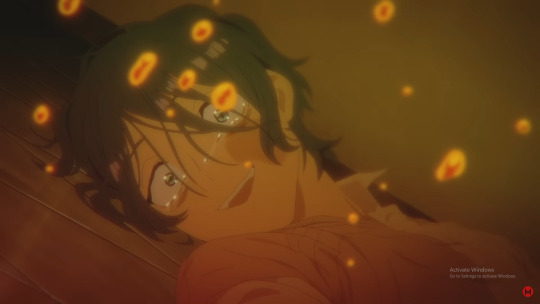
However while Haruka Wants to stay the victim, he wants to stay powerless and pitiful, he really isn't. A tension that often gets played with within his trial. Haruka is able to harm people and threatens Es in Trial 2. First with the idea that he can kill them and then with his life to Guilt Es into forgiving Muu.
I will keep on killing to be a good boy
Haruka Sakurai isn't Weak, but wants to be so he can be loved and adored by the people around him. Because if he isn't perceived as a threat but as someone that can be projected onto without any worry, then he could be loved.
I wanted to be a pitied and loved weakling
However, we do actually have an example of a character who Is Weak, and who is pitied and loved because of that. Who uses her failures and faults to gain power only for it to stumble out of her grasp time and time again because of it.
Muu Kusunoki Fails. A lot. I see a common interpretation of her after It's Not My Fault is Muu as the master manipulator, but if she was she wouldn't be here. She would still be the queen, eating honey like nothing was wrong.
But she isn't anymore, she fell from grace even before she attacked Rei.
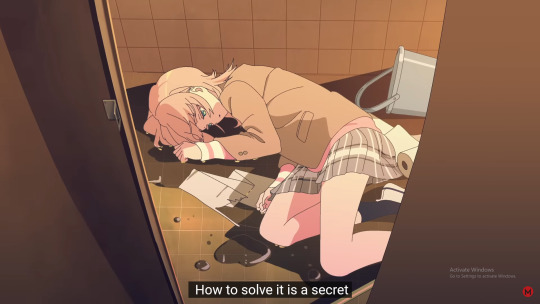
Muu isn't Special, she isn't Powerful. But she is Pitiful, and she uses that pity to gain sympathy and affection from others. Muu Needs to stay the Victim if she wants to be cared for, so she always tries to position herself even when she hurts people.
(Crying B)
Muu: Hey… Prison guard, when you say “I”… Who are you talking about?
Es: [breaking down]
Muu: Prison guard?
Es: [stumbles]
Muu: Prison guard. What’s wrong? Prison guard! [shakes Es] Hey! Prison guard!
Es: Shut up! Don’t touch me!
Muu: [cries] You’re so cruel… I… Even though I was just worried about you… [cries again] I can’t take it anymore. I hate you, prison guard!
If she stays the victim and keeps people's sympathy on her, then she doesn't have to worry at all about people turning on her or hurting her. It's a Service, she acts pitiful, and the people who help her can feel good about doing a Good Thing.
Even if they do eventually turn on her, she can just play victim and hope they stop. Maybe attack their self-esteem as well to really make sure they don't think harder about it.
(Queen B)
M: But if you were like, “I won’t forgive you, Muu! Revenge is bad!,” then wouldn’t that imply that it’s also bad for me to bully someone back after they bullied me? Since we’ve all done something bad anyway, doesn’t that mean that I’ve not done anything wrong in the end?
E: …I think I’m kinda… starting to get your point… maybe…
M: … Warden-san, are you maybe not that intelligent, after all…?
She's using Es' feelings of uncertainty and lack of knowledge to manipulate them into doing what she wants, but she isn't that Good at it. Muu could keep more ground if she continued to play more passive and timid. But instead she acts more aggressive and carefree.
The thing about Muu's strategy is that if She Stops Being Pitiful, it Stops Working. Muu can't let herself be Happy or Confident or otherwise because then she won't be pitiful enough to people. If she does, she gets knocked off her throne and sent back to square one.

Muu is a deeply cyclical character. She cycles from pitiful to queenly and back over and over again. Not only that but when everything is structured through the lens of who's stronger and who's weaker, then you are encouraged to push other people down for your own gain.
Her environment exists as a place where healthy relationships are Discouraged. Because if a relationship doesn't give you anything then you have no use for it.
Muu: Isn’t it exactly because he’s my friend? Isn’t friendship about letting your friends do the things they want? … Are you about to tell me “that’s not what friendship is”? Then what is friendship? You’re together because it’s beneficial for everyone involved, aren’t you?
Conclusion
There's a lot of ways to read these dynamics I think. Tsumi brings up the Karpman's Triangle over here and archivalofsins is working on a post based around TIV. And I can't really put every single facet of a character into this dynamic neatly.
But that's also kinda the point. As stated above, the lack of change and simplicity is important to this dynamic. Its resistant to change and resistant to growth. And any sort of attempt to function outside of it is a threat to it. These mindsets and hierarchies are dangerous because there strict and unchanging, and the deeper your in, the harder it is to get out.

The roles being played here turn people into one dimensional archetypes rather than People. Their motivations, circumstances and personality disappear to fit a convenient narrative of saviors and victims.
It's also much easier to become powerless than to gain power. Muu tried and failed to gain power, while Fuuta was punished and left powerless. It's not a balanced dynamic at all, it lifts up a few people and leaves the rest to rot. But the people who are “stronger” now have to somehow fulfill a role with standards too high to reach. No one wins here, because it's so highly destructive and damaging, and I find the way Milgram interrogates it to be really intriguing.
#milgram#yuno kashiki#shidou kirisaki#muu kusunoki#fuuta kajiyama#kotoko yuzuriha#milgram analysis#milgram meta
98 notes
·
View notes
Text
Theory about the MILGRAM prison
(working on this when I'm supposed to be studying for my psychology exam lol)
(i count this as studying for my a-levels, sue me)
Trigger Warning: WWII Germany mention, war crimes mention
One of the questions I keep coming back to is why the prison and the project is called Milgram. The experiment that Stanley Milgram was famous for, his obedience experiment, had more to do with the study of the banality of evil (that was partly his motivation to perform the experiment in the first place) and human obedience for an authority figure than criminal behaviour. What he studied was the willingness of people to obey instructions, even when doing inhumane acts such as administering increasingly lethal shocks to someone who failed a question in a word quiz. This was actually in attempt to investigate whether N@zi Germans in concentration camps/prisons/whatever and such were pure evil or just following orders because they're 'more obedient than other races of people'. He and his colleagues wanted to explain the inhumane acts done during the holocaust, basically, inspired by the criminal trial of Adolf Eichmann (i think thats the name?) about 3 months before the experiment was conducted. Of course, with a bias for Americans.
He and his colleagues predicted that less than 3% of participants would actually administer up to 450 volts to the learner (who was a confederate, i.e. fake. the initial information that participants received was that they were there to help with a psychology experiment on memory:
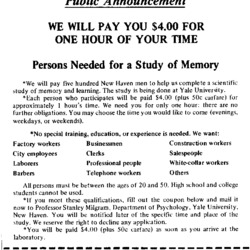
they would then stage a chance drawing of who would be the 'teacher' (the participant) and the 'learner' (the confederate). the participant was always the teacher. they were then separated so the participant can hear the learner, but can't see them. they were given instructions to administer shocks to the learner if they got the wrong answer, which was made to be frequent-ish. it starts of at 15, then 30, then alll the way up to 450 volts. The shocks were fake, but it would sound like, to the participant, that the learner in the other room was actually experiencing electrical shocks. Re-creation of the study later on used a standardised recording of the learner responding to the fake shocks, then silence, as if to indicate that the learner has passed out.)
Actual results? Every single participant in the baseline procedure administered up to 300 volts. 65% of participants continued up to 450 volts.
The results may be affected by the scientist in the room, which, when faced with apprehension or unwillingness by the participant to continue, will say the following things:

Theoretically, participants should feel free to stop and withdraw from the experiment at any time. Reality? the prompts above literally pressured into continuing to increase the voltage, regardless of if they said they wanted to withdraw. Imagine:
"I- I don't feel comfortable doing this. This is wrong."
"Please continue."
"But- this is wrong! He's hurt, will he be okay?"
"The experiment requires that you continue."
(disclaimer: dialogue is fake, i made it up from watching documentaries and recordings(?) of future attempts to reconduct the study. (i.e. based on what the teacher made me watch in class lol))
And so on and so forth. A lot of participants' attempts to withdraw were met with a sound 'no'. I'd say that going through the experiment itself is traumatic all by itself.
So what does this mean for the Milgram Project?
Honestly, I can only guess that, in a way, it shows how willing most of us are to go along with this extremely inhumane premise. Imagine that the prisoners are real people - well this kind of experiment would get absolutely blasted by any ethics board, and the prisoners would be subject to the Japanese criminal justice system and all that. But imagine somehow passed ethics boards and such. And, instead of the judge being internet people who can discuss and judge freely, it is people who are physically there to be the judge, jury and executioner. The information and experience will be repeated for every participant, every fan of the project. The chances of those of us who will call this kind of prison out drastically decreases, for various reasons. Some of Milgram's participants said that their willingness to go along with the study was because they thought the whole thing was 'play-acting'.
And this scenario is exactly what Es is subjected to. They only know to follow the rules of Milgram, because like the participants in Milgram's obedience study, they can't withdraw. They can't get out. They can only complete the objective they were given, because that's the only way this experiment would end. Jackalope is the scientist in the room in this analogy: they keep Es obedient, keep Es from questioning.
And, like the 'learner' in the original experiment, the prisoners are there to distract us and Es from the true aim of the experiment: to what end will we be jackalope's little obedient doll?
then again, I can be completely wrong. I got distracted from studying. (this counts as studying right????)
#then again i can be completely wrong#arc rubbing their last 2 brain cells together to form a thought#it got meta#tw: war crimes mention#milgram#es milgram#milgram project#milgram theory
18 notes
·
View notes
Text
mahiru's forgiveness of kotoko and why it isn't inherently selfless
"im not a milgram analysis blog!" i say. "i'll just post one of the thoughts thats been plaguing my brain and then that's it, no more!"
anyway, mahiru forgives kotoko because she relates to her in some way . Let me explain
i think the way mahiru views kotoko is actually fascinating, and it's kind of unfortunate to see her reasons for forgiving her glossed over so often?

(tl link)

in both instances, when mahiru talks about kotoko, she specifically states that it's because kotoko's "fighting for her own cause" and that "it was for something non-negotiable" .
mahiru is an idealist, and she likes people who works hard. in her eyes, wouldn't someone like kotoko, who is working hard to fight for her own ideals, be admirable?
in the first screenshot, mahiru also says that she forgives kotoko, because she also doesn't want to believe that she herself is wrong. if she says that kotoko is wrong for following her ideals, then what does that make mahiru? aren't they both wholeheartedly committed to their ideals? she doesn't want to believe she's wrong, so if she isn't wrong, then kotoko isn't wrong either, and vice versa. it's not inherently selfless - at the end of the day, mahiru is Desperate to have her worldview validated. it's something that's non-negotiable to her, after all.
it's just .. so fascinating to see that mahiru relates to kotoko in some way, even though their crimes and ideals and personalities and Everything are so different. she doesn't want to be robbed of her love, her reason for living, so why should she rob kotoko of her justice? she doesn't want to be shamed for her worldview, so why should she shame kotoko's?
it always makes me wonder, if mahiru had been forgiven in trial 1, what would she have said in response to kotoko's attacks instead? would she, not actively starving for affirmation of her ideals, see them as wrong? or would she retain the view she has currently and be like muu is now, shrugging it off and saying "well, it couldn't be helped"? genuinely fascinating stuff!
still dont follow me for milgram analysis tho . I still am not a milgram blog and i still post 48 niki shiinas per day. Never ask me for anything ever again o7
#melty rambles#milgramposting#milgram#milgram meta#mahiru shiina#kotoko yuzuriha#finally . all thoughts out of my brain . I can get her out of my head forever now
37 notes
·
View notes
Text
Why you should vote Kotoko Yuzuhira innocent with me <3 (when the time comes around)
1. Can you imagine how funny it’d be
2. You’d be supporting women’s wrongs + the wrongs of the lesbian of all time
3. If Futa gets any sense of superiority over her I will personally destroy everything within a 5 mile radius (I say this as someone who likes him)
4. No but seriously can you imagine how funny it would be.
5. No matter how deep and complicated we think our reasons for voting are, at the end of the day it’s not like we’re delivering anything less black and white than a “forgive” or “not forgive.” This game is mean and every option (besides maybe innocent for everyone? As hinted in a voice drama I forgot which one tho) will end horribly somehow. It’s impossible to predict what anyone’s gonna do or how they’re gonna react. She might protect the innocent. She might double down on the guilty. She might get retaliated against. She might rethink herself. Fifth unthinkable option. We don’t know. So whatever. Go seigi girl go!
#milgram#kotoko yuzuhira#for the record: yeah. a lot of these reasons are jokes and basically all meta.#but it’s not like these reasons aren’t driving me regardless#we have a highly plot relevant lady. I want to support her with the same vigor I’d support any annoying plot relevant twink
32 notes
·
View notes
Text
People are out here debating whether amane can take on shidou "is he strong enough" "of course he can take care of a CHILD" "but amane can sabotage medical supplies" etc. etc.
and I'm the only motherfucker out here delusional enough to be worrying about kotoko of all people having 'that fang extracted' if she's compromised I'm sorry I'm just on a different plane of existence to you I'm not even here I'm Gone goodbye
#milgram#capri talks#kotoko yuzuriha#shidou kirisaki#I have to emphasise I do not think shidou is going to 1v1 kotoko I'm not a fool. but if she gets battered from guilty verdict shenanigans-#-I think we seriously have to consider a future where shidou does the thing in the lyrics he referred to and we affirmed back okay Okay.#screams. I'm putting my red string together I'm in that fun state of what if-ing let me cook#meta
28 notes
·
View notes
Text
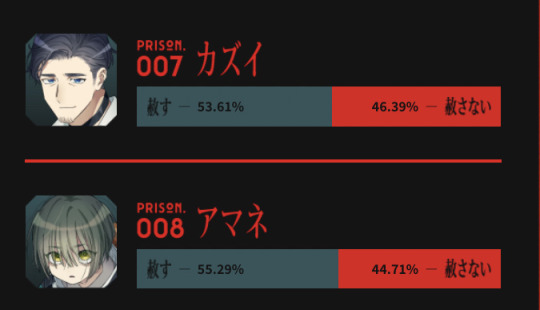
can everyone go vote them both forgiven before i blow a freaking gasket
#no i don’t care if you have no clue what this is go to milgram.jp go to judge and click innocent/forgiven for kazui and amane#why are people still meta voting!!! stop judging the 12year old unforgiven!!!!!#‘oh but she’ll hurt shidou🥺🥺’ SHIDOU’S A GROWN MAN HE CAN HANDLE A 12 YEAR OLD OUT FOR HIS BLOOD#and voting her unforgiven won’t necessarily stop her from trying to attack him#it is more likely to make the situation worse. as the trial one results proved#and also he’s a doctor he can heal himself it’s literally fine#milgram project
20 notes
·
View notes